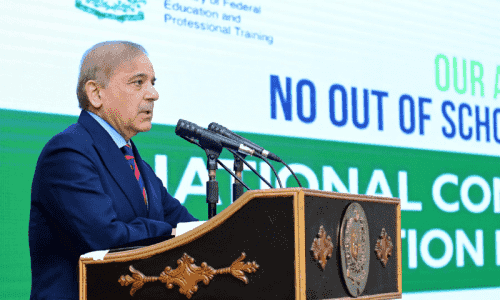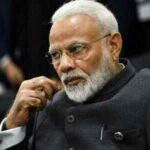ISLAMABAD: On Wednesday, Prime Minister Shehbaz Sharif declared a national emergency in education and committed to enrolling approximately 26 million children who are not in school and promoting literacy. The goal is to help the motherland regain its lost ground and become one of the world’s most educated societies.
With steadfast determination and the backing of the provinces, we shall confront the issue of 26 million children who are not attending school today. They will return to school, we promise.I therefore proclaim an emergency in Pakistani education going forward.Speaking during the National Conference on Education Emergency, the prime minister declared, “We will do it in Pakistan the way we did it in Punjab.”
“I will oversee the program personally and personally meet with all chief ministers, regardless of their political affiliations, with the goal of marching together and expressing the hope that the provinces will also extend their support,” the prime minister declared.
Federal ministers, legislators, vice chancellors, ambassadors, and development partners were present during the ceremony.
“Our children and our future are at stake here. Clearly, this is an extremely difficult undertaking. However, countries that had previously experienced hardship and loss emerged from the ashes of their losses. Japan and Germany serve as examples. How come Pakistan can’t be? He continued, “I promise that one day Pakistan would rank among the most educated societies if we work together to find our place.
The prime minister stated that stunted development and the 26 million children who are not attending school are Pakistan’s two biggest problems, both of which call for significant financial resources. “The true challenge lies in having the will to do,” he remarked, citing Pakistan’s demonstration of its resolve to become a nuclear power in spite of external demands and its sacrifice of almost 80,000 lives to eradicate terrorism and bring about peace in the nation.
Dr. Khalid Maqbool Siddiqui, Minister for Federal Education and Professional Training, stated in his speech that Pakistan was at a crossroads in its development and had no choice but to take action in the education sector.
“The educational numbers in Pakistan are unsettling, worrisome, and depressing. Over 26 million kids are not attending school. This figure exceeds the combined population of 150 nations worldwide,” he continued.
According to Abdullah A. Fadil, a representative of Unicef in Pakistan, more than 70% of Pakistani children ten years old are illiterate. He regretted that, in spite of constitutional commitments, education in Pakistan was neither free nor mandatory yet.
He claimed that Pakistan might reclaim its lost reputation by increasing investments in youth and education. Pakistan was home to the first physics Nobel laureate and had just sent a space mission to the moon.
With 60% of its population under 30, Pakistan is at a crossroads where difficult decisions must be made, according to British High Commissioner to Islamabad Jane Marriott.
She stated that the meeting demanded immediate action, promising her nation’s full cooperation to help Pakistan reach the objective. These steps included more money, inclusivity, numerous shifts in schools, and keeping the children.
In her video message, World Food Programme Country Director Coco Ushiyama stated that school meals were among the best projects to invest in the future of the nation and that food security and education went hand in hand.
According to World Bank Vice President Martin Raiser, 40% of children in Pakistan have stunted growth, with the percentage rising to 60% in impoverished areas.
Mr. Raiser stated that investments in climate resilience were necessary due to Pakistan’s education system’s susceptibility to climate change.
In a video message from Makalu Mountain, Pakistan’s most accomplished mountaineer, Naila Kiani, attributed her success to self-belief and education. To help females realize their aspirations, she asked the prime minister and chief ministers to increase funding for their education.
In the meantime, PM Shehbaz chaired a separate meeting on Wednesday and gave the go-ahead for the relevant authorities to start the process of establishing the Pakistan Skill Company and Pakistan Skill Development Fund right away in order to unify technical and vocational education across the nation and give Pakistani workers overseas better employment opportunities.








